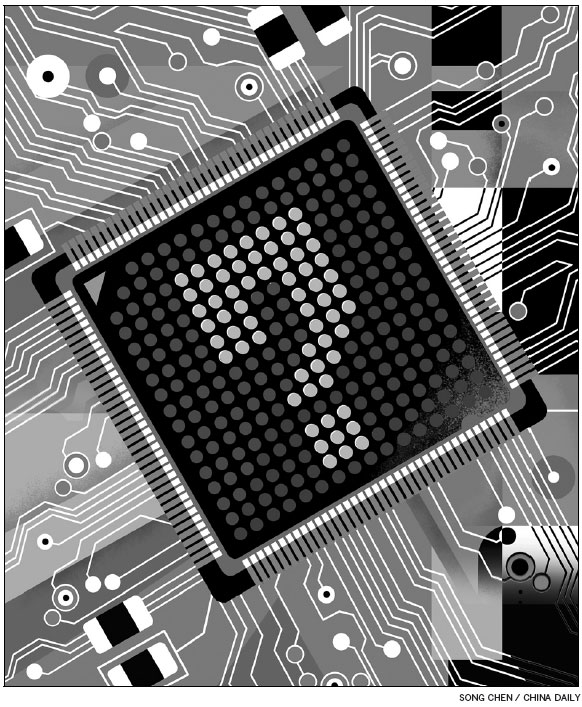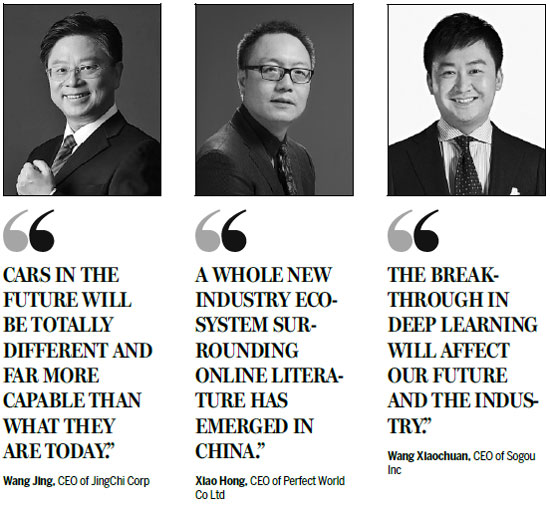China takes lead in mobile internet and AI
In the past year, what transformations in the internet arena or the technology sector have the ability to influence our future or the future of the industry? What do you think are the reasons for this transformation?
Wang Jing: Take automobile sector as an example. I see three huge trends.
First, electric cars, and that decreases auto manufacturing threshold.
Second, shared economy and MaaS (mobility-as-a-service), and sales will shift from B2B (business-to-business) to B2C (business-to-consumer).
Third, intelligent cars. As Morgan Stanley predicts, the value of software in a car will increase to 60 percent compared with 10 percent today. Rapid gains in battery technology, people's aspirations for a more efficient and safer trip, combined with the rise of AI together make it. These three trends will improve the world in profound and unexpected ways.
Xiao Hong: In the first half of 2017, the number of users of online entertainment products and services grew steadily. An increasing number of users chose mobile devices to listen to online music, watch online videos, play online games and read e-books, up by 4 percent year-on-year.
Specifically, mobile gaming users increased 9.6 percent in the first half of this year, compared to the same period last year.
A whole new industry ecosystem surrounding online literature and intellectual properties has emerged in China.
The key sector of digital literature is going global and copyright revenues will further boost the market growth.
Major online video companies are fostering the pan-entertainment ecosystem to involve a wide range of sectors, including online literature, comics, movie and TV dramas and gaming.
Wang Xiaochuan: The breakthrough in deep learning will affect our future and the industry. It could make original products, services and business institutions more efficient. Human-computer interaction makes it easier for human beings to deal with services and hardware.
The reason for the shift is that in the past, human beings taught existing rules to machines, or told machines questions and answers to let them memorize or learn. However, in the past year, human beings let the machines find, and then evaluate, answers.
This year is seen as the start of AI's impact on various sectors becoming evident. How has AI improved your company's business? What will you do to better tap into the technology?
Wang Jing: JingChi AI is a mobility company powered by artificial intelligence. We are committed to creating an innovative mobility solution self-driving technology for the China market where every trip will be safe, efficient, cost-effective and leisurely.
We apply artificial intelligence in modules of perception and path planning and control, to make the vehicles better see and understand the environment. AI is the core intelligence that drives self-driving technology development. We believe the company that can leverage AI will redefine vehicles and even reshape the future of mobility.
Xiao Hong: With the rapid development of China's internet sector, the market is almost saturated. The global tech industry will enter a new phase. In the eyes of the more and more sophisticated internet users, the price war and the viruses-spreading model will not play a key role.
Wang Xiaochuan: On the one hand, Sogou emphasizes natural interaction. Systems such as speech recognition, human-computer interactions could allow humans and machines to communicate better. On the other hand, Sogou also emphasizes the ability to compute knowledge.
For example, in verticals such as medical and vehicle navigation, the search engine can be more closely related to the specific scenes and understand the users' needs, such as making medical diagnosis, or accurately recommending nearby gas stations.
In the next five years, which sector do you think will most likely disrupt the internet or the technology space? In other words, what do you think will be the next hot spot or trend?
Wang Jing: Self-driving. For years, China lagged in the automotive sector, but things may change in the near future, since cars will gradually become software-defined - it's not only about playing games or sending WeChat messages in cars. It's also about mobility redefined by software models that stitch together the sensor-fusion, path planning and control, car OS (operating system), on-board computing system and human-machine interface.
Cars in the future will be totally different and far more capable than what they are today. China is a key player in artificial intelligence, and that gives China the chance to seize the leadership in the automobile sector.
Xiao Hong: As far as I am concerned, the future trend in the next five years will be as follows:
The netizen dividend will peak in the market.
The venture capital market will prefer to invest high-quality resources on major startups in the industry.
Globalization will be deemed by Chinese tech companies as an inevitable but cautious path.
The mobile video streaming sector will enter a transition period, highlighting the importance of social networking functions and valued-added content.
Online video and traditional video sectors will integrate with each other.
The key to success will be membership and self-made content.
Wang Xiaochuan: In the future, AI will bring predictable changes to the internet industry. I think AI could be divided into two parts: the virtual world and machine intelligence.
The former refers to games, novels (fiction/literature), music and video. Technological developments in these sectors will bring us deeply to the virtual world and let human beings find their own sense of existence.
The latter is to let machines make decisions. The significance of AI lies in letting machines make decisions, which contains great commercial value.
Contact the writers at ouyangshijia@chinadaily.com.cn


(China Daily 12/03/2017 page5)

 Print
Print Mail
Mail
 20 Cultural Symbols
20 Cultural Symbols Why Zhejiang
Why Zhejiang Experiencing high-tech products at WIC
Experiencing high-tech products at WIC Zhejiang Release
Zhejiang Release Zhejiang News
Zhejiang News